XV Century Catalan playing cards
XV Century Catalan Playing Cards, featuring four female Sotas, four Aces and four cards from the suit of batons.
These ancient playing cards were discovered inside the binding material of a printed Catalan book dated 1495. As there are no other surviving examples, it is likely that it is a sole remnant of an archaic Spanish-suited pattern, perhaps used in a particular area, which has been superseded. The four female Sotas (not Queens) stand inside niches and on circular bases; they are quite similar to those in later Portuguese packs. But are they female, or in fact young male figures? They wear long robes reaching the floor and each holds their respective suit symbol in their right hand.
It seems likely that the complete pack contained 48 cards = 4 sheets of 12 cards. We do not know whether the kings were seated or standing, or whether there were cavaliers or knights on the missing cards. The batons are knobbly and arranged in a similar way to what we know today as ‘Spanish’: we might expect the cups, coins and swords to be similarly arranged. The four aces are decorated with primitive acanthus leaves or foliage, and two of them are also supported by lions.
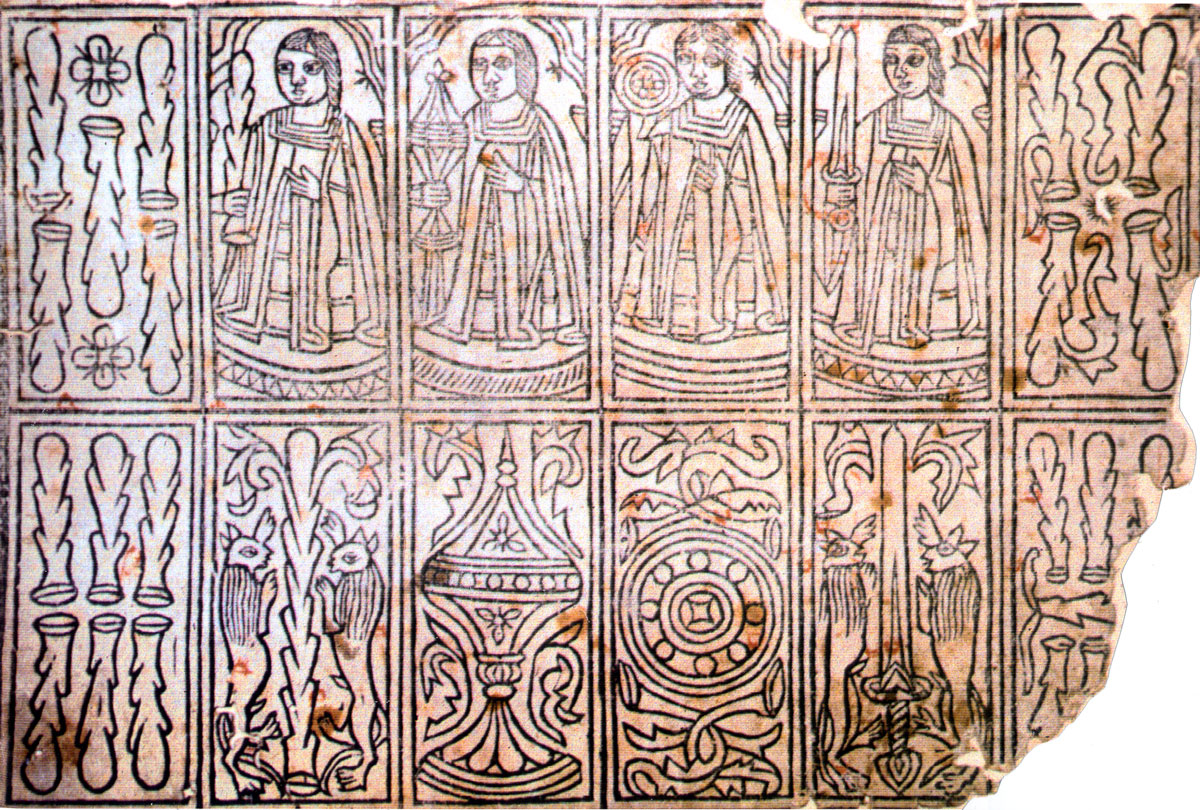
Above: uncoloured and uncut sheet of 12 XV Century Catalan Playing Cards, Barcelona, printed in black onto thin paper and then glued onto a manuscript (latin) page, discovered during restoration inside the binding material of a Catalan book titled El Llibre de les Dones, printed by Johann Rosembach and dated 1495. Four (female) Sotas stand inside niches and on circular bases. They wear long robes and each holds their respective suit symbol in the right hand. Note that they are not 'Queens' and have no crowns. The cards were housed in the Instituto Municipal de Historia (Barcelona) when the photograph was taken (1986), and also illustrated in Trevor Denning's The Playing-Cards of Spain, Cygnus Arts, London, 1996.
NOTE: the original cards are now preserved in the Arxiu Històric de la Ciutat de Barcelona • 26453-Antiquària • zoom ►
If the Latin suit system, including the Spanish variant illustrated here, derived from Islamic cards, then we have an early example of cards faithful in some ways to their Islamic origin, produced at a time when possibly both styles were still in use, and before other versions of Spanish-suited cards were adopted. See also: Moorish Playing Cards • Mamluk Cards • Master of the Banderoles • Gothic Spanish Cards.
The materials used in card games are very perishable so surviving early specimens are very rare. More than one example has come to light inside book bindings when these needed to be repaired, as in this case. Because games are a magnificent way of promoting social relationships, as well as “unleashing passions”, these late fifteenth century playing cards give us a sense of how the Catalan capital absorbed foreign cultural elements and in turn spread their own style abroad.
By Simon Wintle
Spain • Member since February 01, 1996 • Contact
I am the founder of The World of Playing Cards (est. 1996), a website dedicated to the history, artistry and cultural significance of playing cards and tarot. Over the years I have researched various areas of the subject, acquired and traded collections and contributed as a committee member of the IPCS and graphics editor of The Playing-Card journal. Having lived in Chile, England, Wales, and now Spain, these experiences have shaped my work and passion for playing cards. Amongst my achievements is producing a limited-edition replica of a 17th-century English pack using woodblocks and stencils—a labour of love. Today, the World of Playing Cards is a global collaborative project, with my son Adam serving as the technical driving force behind its development. His innovative efforts have helped shape the site into the thriving hub it is today. You are warmly invited to become a contributor and share your enthusiasm.

Leave a Reply
Your Name
Just nowRelated Articles
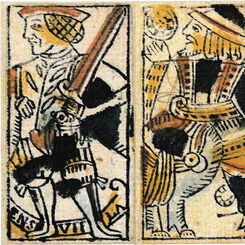
Sevilla 1647 reproduction
Facsimile of Spanish-suited pack produced in Sevilla, Spain, 1647.
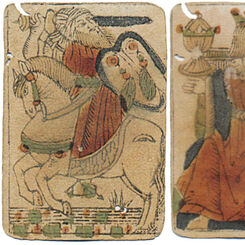
XV Century Spanish-suited playing cards
XV Century Spanish-suited playing cards with moorish influences
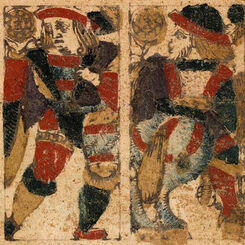
Toledo, 1584
Archaic Spanish-suited deck with 48 cards made in Toledo in 1584.
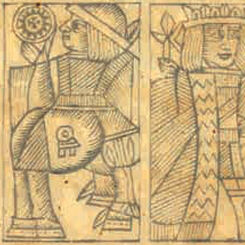
Navarra Pattern, 1682
Navarra pattern produced for the Pamplona General Hospital Monopoly in 1682.
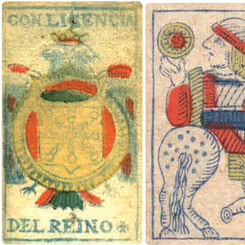
Navarra Pattern
Navarra Pattern produced for the Pamplona General Hospital Monopoly.
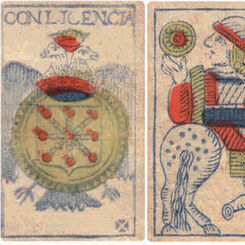
Navarra Pattern, 1793
Navarra pattern by an unknown cardmaker with initials I. I., 1793.
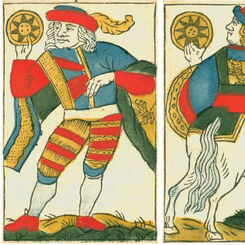
Anonymous Spanish Suited pack, c.1760
Anonymous archaic Spanish suited pack, c.1760.

Malta
The so-called ‘Dragon Cards’, with winged monsters on the four Aces, are an enigmatic aspect of earl...
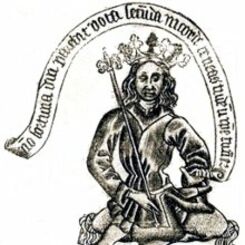
Master of the Banderoles
Playing Cards by the Master of the Banderoles, one of the earliest professional printmakers.
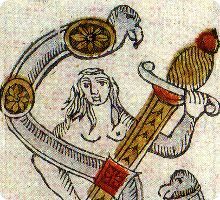
Joan Barbot
Joan Barbot, San Sebastian c.1765-1810.
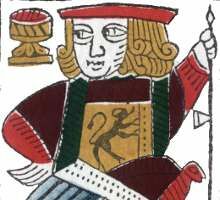
Navarra, XVII Century
Facsimile of 17th century Spanish-suited playing cards produced by Erregeak, Sormen S.A., Vitoria-Ga...
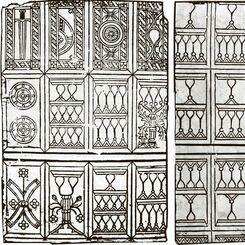
Moorish playing cards
These two uncoloured, uncut sheets of early Moorish playing cards were formerly preserved in the Ins...

Gothic Spanish-suited cards
These cards may be a typical example of early 'standard' Spanish playing cards, maybe from before Co...
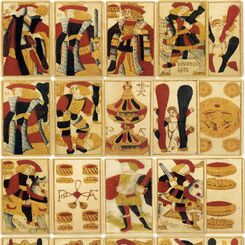
Phelippe Ayet, c.1574
Archaic, late medieval Spanish-suited playing cards printed by Phelippe Ayet, c.1574.
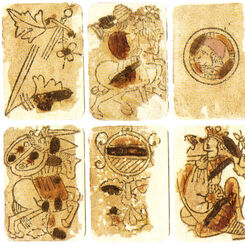
Baraja Morisca — Early XV century playing cards
Primitive Latin suited pack, dated by paper analysis as early XV century, which makes this one of th...
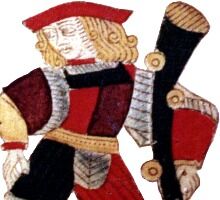
Spanish National Pattern
Probably originating in Spain in the seventeenth century or even earlier, this pattern became strong...
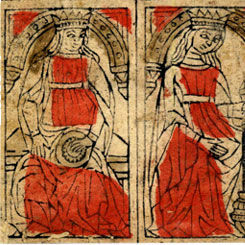
XV Century Italian Playing Cards
Cards from a pack of an early form of north Italian playing cards, with the swords back-to-back and ...
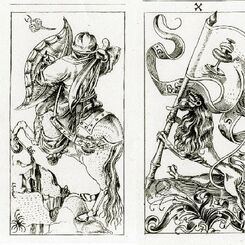
South German Engraver
A pack of 52 cards with banner 10s, female 'Sotas', horsemen and kings, the pack was engraved in the...

16th century cards discovered in Peru
Fragments of playing cards and 2 dice were unearthed in a 16th century rubbish tip adjace...
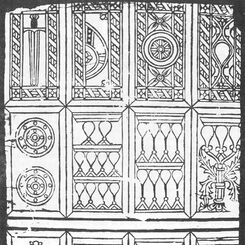
A Moorish Sheet of Playing Cards
This article was originally published in “The Playing-Card”, the Journal of the International Playin...
Most Popular
Our top articles from the past 60 days


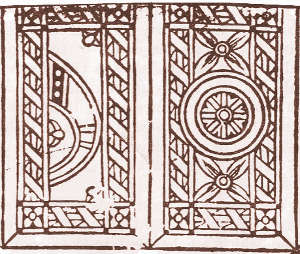
 Your comment here. Your comment here. Your comment here. Your comment here. Your comment here. Your comment here. Your comment here. Your comment here. Your comment here. Your comment here. Your comment here. Your comment here. Your comment here. Your comment here. Your comment here. Your comment here. Your comment here. Your comment here. Your comment here. Your comment here. Your comment here. Your comment here. Your comment here. Your comment here. Your comment here. Your comment here. Your comment here. Your comment here. Your comment here. Your comment here. Your comment here. Your comment here.
Your comment here. Your comment here. Your comment here. Your comment here. Your comment here. Your comment here. Your comment here. Your comment here. Your comment here. Your comment here. Your comment here. Your comment here. Your comment here. Your comment here. Your comment here. Your comment here. Your comment here. Your comment here. Your comment here. Your comment here. Your comment here. Your comment here. Your comment here. Your comment here. Your comment here. Your comment here. Your comment here. Your comment here. Your comment here. Your comment here. Your comment here. Your comment here.




















